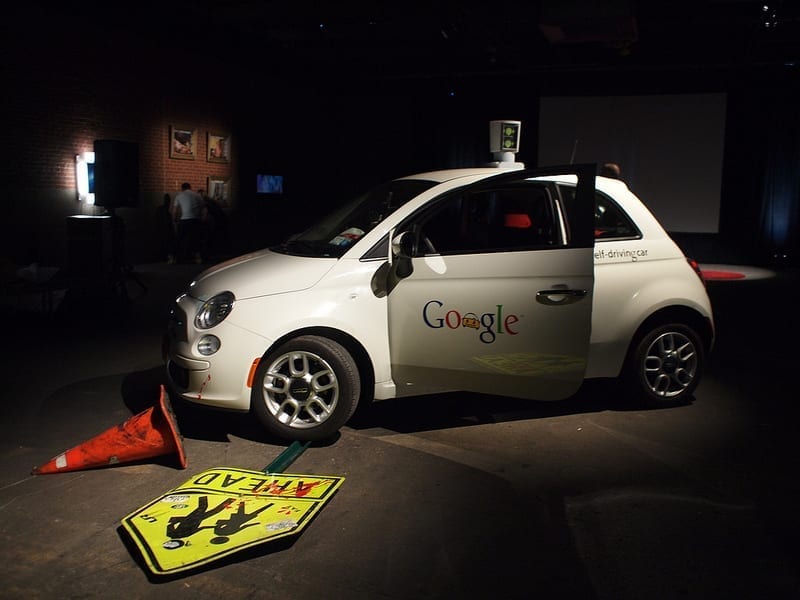The march of progress seems inevitable, doesn’t it? Everybody knows that driverless cars are coming, and that we should prepare ourselves to accept and work with (or around) this eventuality. Companies are making investments in new technology, while politicians shift laws around to accommodate the industry. The question that few people seem to be asking is whether or not driverless cars are a good idea, and fewer still are questioning whether we really need them.
The march of progress seems inevitable, doesn’t it? Everybody knows that driverless cars are coming, and that we should prepare ourselves to accept and work with (or around) this eventuality. Companies are making investments in new technology, while politicians shift laws around to accommodate the industry. The question that few people seem to be asking is whether or not driverless cars are a good idea, and fewer still are questioning whether we really need them.
Currently, all cars, autonomous or not, must have brake pedals and steering wheels. While they’re useful for human drivers to be able to take control of an autonomous vehicle (especially while the technology is experimental), car companies see this regulation as needlessly burdensome in the long run. Last week, Congress began reviewing these safety standards with an eye towards greasing the wheels for companies wanting to bring these cars to market. What if the widely held notion of the inevitability of driverless technology itself creates a self-fulfilling prophecy?
Individual states have also embraced the inevitability of driverless cars. Texas, long willing to throw workers under the bus, recently passed a law allowing robocars on all Texas roads “without any intervention or supervision by a human operator.” Good thing so many of those roads are long and straight. Other states, such as Washington and Michigan, are also competing to be technological hotbeds for autonomous vehicle development.
Futurists and neo-Luddites alike have reasons to be concerned about the changes that autonomous vehicles will bring.
On one hand, driverless cars could transform our society in ways we can barely imagine. Take retail, for example. Brick and mortar stores may become less relevant not only when online purchases can be shipped quickly and conveniently, but also when small versions of stores themselves can be called up at will to a would-be shopper’s driveway. More frivolously, the morality police can look forward to entertaining their inner sinners with images of canoodling teenagers (or, presumably, randy morality police themselves, on their day off) making the open road their lover’s lane.
Assuming widespread autonomous tech gets off the ground faster and more reliably than yesterday’s promises of flying cars and jetpacks, though, driverless cars are set to burn an alarming swath of unemployment through our already delicate economy. Uber, hailed as a way for anyone to bypass regulation and undercut a more regulated taxi industry, set its sights on getting rid of its drivers from the very beginning. And while truck driving is currently a harrowing, abusive industry at its worst, will replacing three million truck drivers with autonomous technology be an improvement? We’re always told that lost jobs will be replaced with “new jobs we can’t even imagine yet,” but it will take plenty of those to employ not just displaced drivers, but all of the people who depend on the trucking industry for a living, from truckstop waitresses to the employees at stores where the waitresses spend their tips.
It’s a really big change.
That’s why it’s worth considering the inevitability of driverless cars. “Progress” isn’t helpful when it’s going in a direction contrary to the interests of humans (or other living creatures, for that matter). As author and thinker John Michael Greer explains in a presentation about “Techno-Utopianism and the Fate of the Earth,” technology is subject to the law of diminishing returns. We have reached a level where ever-increasing technological sophistication is more expensive, the “rewards” may truly be social negatives, and any benefits accrue, instead, to the owners of capital more than anyone else. We already subsidize roads beyond the costs that drivers are willing to pay to use them. What else will we give up to support autonomous tech and those who own the vehicles and factories that make them?
John Michael Greer: False Promises, posted by IntlForum
While driverless cars seem inevitable, always consider who is pushing that message. We must remember that promoting or using any technology is a choice. Just like the Luddites challenged the adoption of automated spinning and weaving devices that put workers out of their jobs or made them work even harder for more hours, we also have a choice. While this analysis leaves out important questions about energy use and the long-term sustainability of economic growth, history allows us to see further down the road than Ned Ludd could, and it is a hard road indeed. As long as people depend upon the kindness of employers in order to feed their families and keep a roof overhead, automation will be a problem. Changing either the automation trend or the distribution of resources that automation upsets will be necessary going forward, or all of us will pay the price.
Related: The Measure of Manhood: Crisis


Join the conversation!